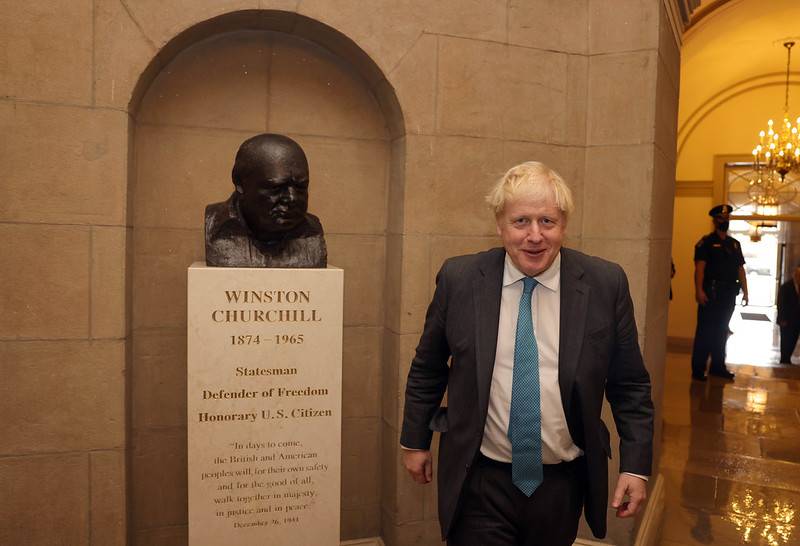Prime Minister Boris Johnson says he’s ready to take “bold decisions” to rebuild the economy after the coronavirus pandemic, reports Asian Lite News
Prime Minister Boris Johnson said he was ready to take “bold decisions” to rebuild the economy after the coronavirus pandemic as his Conservative Party met Sunday for its first annual conference since 2019.
The Tory conference opened Sunday in the northwestern city of Manchester as a shortage of truck drivers to delivery fuel across Britain continues to cause empty pumps and long lines at many gas stations. Concerns about wider labor shortages in Britain, along with higher taxes, rising energy bills and a cut in welfare payouts beginning this week, are among other challenges facing Johnson.
Johnson argued that Britain’s economy is simply going through a post-Brexit “period of adjustment” after leaving the European Union, and said supply chain problems and shortages in food and fuel could continue until Christmas.
Despite the economic worries, opinion surveys suggest that Johnson and his Conservatives were polling ahead of the opposition Labour Party.
Before the conference, Johnson said he was ready to take the “big, bold decisions on the priorities people care about, like on social care, on supporting jobs, on climate change, tackling crime and leveling up.”
Asked about the truck driver shortage crisis, Johnson said it was a “chronic problem” associated with an over-reliance on migrant workers who were willing to work for low wages and poor conditions. He said he wouldn’t repeat that mistake.
“The way forward for our country is not to just pull the big lever marked uncontrolled immigration, and allow in huge numbers of people to do work,” he told the BBC.
Referring to the 2016 referendum that led to Britain’s exit from the EU, Johnson said: “When people voted for change in 2016 … they voted for the end of a broken model of the U.K. economy that relied on low wages and low skills and chronic low productivity. And we’re moving away from that.”
He maintained that the situation at gas stations is improving after more than a week of disruptions, although retailers say drivers still can’t get gas at many pumps in the London area and southeast England.
Britain has long suffered from a shortage of truck drivers, but the problem has come to a head with the combination of Brexit, which ended workers’ freedom of movement from the EU to Britain, and the pandemic, which severely limited travel and halted training for new domestic drivers who weres upposed to replace those who left for their home countries due to Brexit.
Brexit and Covid-19 have also exacerbated existing labour shortages across a wide range of industries from hospitality to construction and the food industry.
Around 200 military personnel, including 100 drivers, will take to the roads starting Monday to help ease fuel supply shortages.
The Petrol Retailers Association has welcomed the move, but warned it would have a limited impact given the relatively small numbers involved. The organization’s chair, Brian Madderson, said Sunday that while the crisis was “virtually at an end” in Scotland and northern England, more than one in five stations in London and southeastern England were still out of fuel.
The government also said Friday it was extending an emergency visa program that seeks to bring in thousands of foreign truck drivers.
Marshalled by a large police deployment in Manchester, more than 2,000 protesters rallied against the Conservatives on the opening day of their conference Sunday.
Channelling Churchill
One anti-Brexit protest banner paraphrased a famous speech by Winston Churchill, Britain’s World War II leader – and Johnson’s political hero.
“Never has so much been destroyed for so many by so few #Brexit,” it read.
But anger persists in some quarters at his handling of the pandemic and a death toll of more than 136,000, as well as claims of cronyism benefiting Conservative donors for Covid contracts.
On Brexit, he has angered Brussels by threatening to shelve problematic new trading arrangements for Northern Ireland, and tensions are high with France over fishing rights.
Last week, opposition Labour leader Keir Starmer attacked Johnson as a Brexit-obsessed showman without a plan, even if his popularity remains relatively high with the public.
“We have a fuel crisis, a pay crisis, a goods crisis, and a cost of living crisis, all at the same time,” Starmer told his own party conference.
Women’s safety
Johnson meanwhile faces an outcry over the murder of Sarah Everard by London Metropolitan Police officer Wayne Couzens.
The 33-year-old marketing executive’s abduction in south London in March triggered nationwide anguish and debate about the safety of women and girls.
Couzens, 48, was on Thursday jailed for the rest of his life after falsely arresting Everard on the pretence she had broken coronavirus restrictions, before raping and murdering her.
Over the weekend, the Met confirmed that Couzens had been approved for armed patrols of parliament on five occasions last year.
The London force – Britain’s biggest – has been widely panned for advising women to flag down a passing bus if they are stopped by an officer they do not trust.
However, Johnson backed that advice in the BBC interview.
“My view is that the police do – overwhelmingly – a wonderful job,” he said, calling on “women of all ages to trust the police”.
ALSO READ-Miliband says Boris is miles off UN climate success
READ MORE-Boris calls on rich nations to meet $100bn climate pledge

Leave a Reply